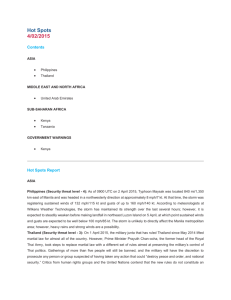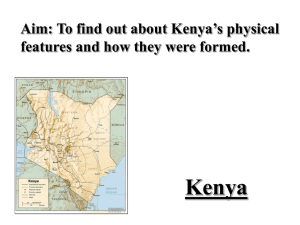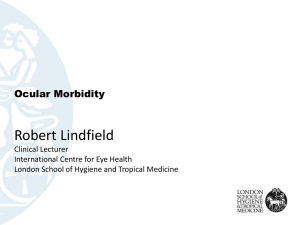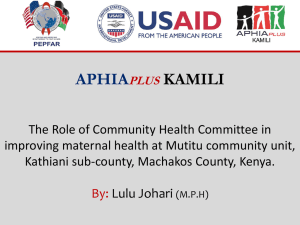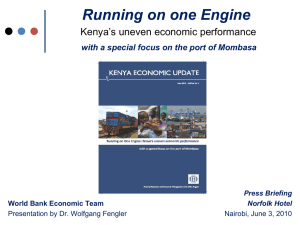Presentation - Doing Business
advertisement
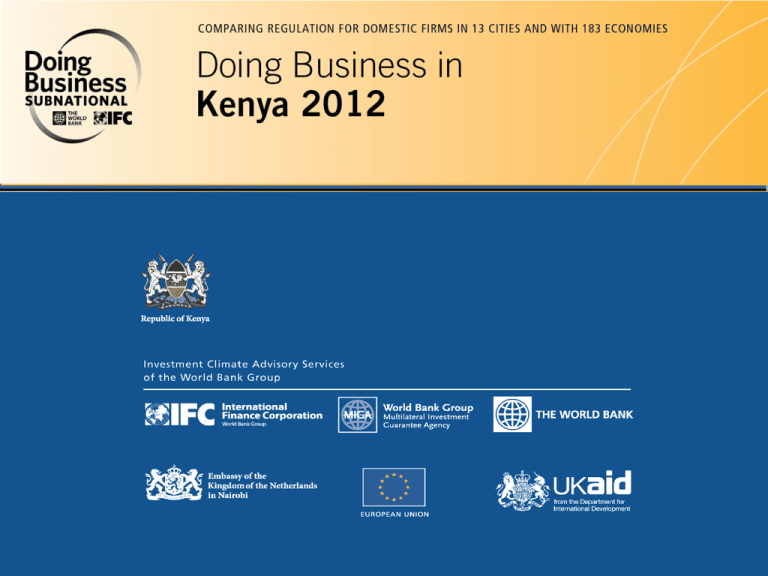
1 Presentation of report findings Nairobi – June 26, 2012 Mierta Capaul Program Manager Global Indicators and Analysis Department World Bank 2 What does Doing Business measure? Doing Business indicators: Focus on regulations relevant to the life cycle of a small to medium-sized domestic business. Are built on standardized case scenarios. Are focused on the formal sector. Are measured for the most populous city in each country. DO NOT measure all aspects of the business environment such as: macroeconomic stability, corruption, level of labor skills, proximity to markets, or regulation specific to foreign investment or financial markets. 3 Doing Business indicators – 11 areas of business regulation (10 included in the ranking) Start-up Starting a business Minimum capital requirement, procedures, time and cost Expansion Operations Registering property Dealing with construction permits Procedures, time and cost Procedures, time and cost Getting credit Credit information systems Paying taxes Payments, time and Total Tax Rate Movable collateral laws Protecting investors Insolvency Resolving insolvency (formerly Closing a business) Time, cost and recovery rate Trading across Disclosure and liability in related party transactions borders Documents, time and cost Enforcing contracts Getting electricity Procedures, time and cost to resolve a commercial dispute Procedures, time and cost Employing workers (annex) Entry 4 Property rights Investor protection Access to credit Administrative burden Flexibility in hiring 4 Recovery rate Reallocation of assets Subnational Doing Business: How does Kenya benefit from it? • Goes beyond largest city to create baseline and capture local difference in regulations • Gives specific locations an opportunity to tell their story • Pinpoints bottlenecks and provides good practice examples 1 Diagnostic Tool 2 Reform Instrument 3 M&E Device • Measures progress over time through repeated benchmarking • Creates an incentive to maintain the reform effort even when governments change 5 • Allows locations to compete locally and globally • Promotes peer to peer learning • Initiates a reform process by engaging local governments and reforms stakeholders Doing Business in Kenya in 2012, second in the subnational series, benchmarks 13 locations Doing Business in Kenya 2010 • Created micro-level data for 10 cities in addition to Nairobi: Eldoret, Garissa, Isiolo, Kilifi, Kisumu, Malaba, Mombasa, Narok, Nyeri, and Thika Doing Business in Kenya 2012 • Adds 2 new cities (Kakamega and Nakuru) • Updates benchmarks for cities previously measured • Tracks business reforms in all cities • Data is current as of March 2012 Both reports cover 4 indicators 6 1. Starting a business 2. Dealing with construction permits 3. Registering property 4. Enforcing contracts What are the key findings? Overall, it is easier to start a business, deal with construction permits, register property and enforce a contract in Malaba, Narok and Thika. Business reforms implemented over the past three years have made it easier for local entrepreneurs to start and operate a business throughout Kenya. Challenges remain – overall starting a business is burdensome and construction permitting is more expensive due to costly environmental expert assessments. 7 No single city outperforms the others in more than one area Malaba Narok Thika Garissa Eldoret Mombasa Isiolo Kisumu Kilifi Nyeri 1 2 3 4 5 6 7 8 9 10 Ease of starting a business 6 8 1 12 10 9 2 13 3 10 Kakamega Nakuru Nairobi 11 12 13 6 4 5 City 8 Aggregate rank Ease of dealing Ease of Ease of with construction registering enforcing permits property contracts 1 4 3 5 5 2 3 7 7 3 8 1 2 7 5 7 1 8 4 13 4 10 2 9 11 11 6 10 6 10 9 13 11 9 6 12 12 11 13 It is easier to do business in all 13 cities now than 3 years ago City Starting a business Business reforms National Mombasa Eldoret Isiolo Garissa Kakamega Kilifi Malaba Nakuru Narok Thika Kisumu Nairobi Nyeri Local Dealing with construction permits National Local x x x x x x x x x x x x x Registering property National Doing Business reforms making it easier do to business Doing Business reforms making it more difficult to do business 9 Local Enforcing contracts National Local Business entry reforms resulted in time and cost savings for local entrepreneurs 81.2 DB Kenya 2010 average 67 48.4 DB Kenya 2012 average 45 Sub-Saharan average 2012 37 43.4 12 10 8 Procedures (number) 10 Time (days) Cost (% of income per capita) Time differences to start a business across locations reveal potential for future improvement DB Kenya 2012 average (45 days) 11 DB Kenya 2010 average (67 days) Obtaining building plan approvals is 4 times faster in Malaba than in Nakuru Building plans approval Malaba 14 Garissa 15 Isiolo 15 Narok 33 Eldoret 34 Nyeri 23 Kilifi 24 Mombasa 30 Kisumu 30 Kakamega During and after construction Connection to utilities 42 Nairobi 40 Thika 45 Nakuru 55 0 12 Environmental approval 25 50 75 100 125 Time (days) Mombasa overhauled its construction permitting process 13 Variations in time to register property point to opportunities for local improvements Mombasa Malaba 32 Eldoret 44 Kisumu 45 Narok Nyeri Kenyan average Thika 53 56 61 63 Nakuru 71 Kakamega 71 Nairobi Kilifi Garissa Isiolo 14 28 73 76 86 93 Isiolo remains the only city charging a local property transfer tax Isiolo reduced the cost to register property 25 24.1 % • Isiolo cut the local transfer tax by 15 percentage points (from 20% to 5%) reducing overall costs by 62% 20 15 10 5 9.1% • But Isiolo remains the only city charging a local property transfer tax, in addition to the nationally mandated stamp duty of 4% 0 Cost (% of property value) 15 15 Enforcing a contract in Kenya is easier than in the average Sub-Saharan Africa city 16 16 A city adopting all Kenyan best practices would rank 14 places higher than Kenya’s* current rank in Doing Business Doing Business indicator Starting a business Dealing with construction permits Registering property Enforcing contracts Best practices within Kenya 10 procedures All cities 32 days Nairobi 39.3% of income per capita Narok 9 procedures Kisumu, Malaba, Mombasa, Nairobi, Thika 64 days Garissa, Malaba 133.7% of income per capita Malaba 9 procedures All cities 28 days Mombasa 4.1% of property value Thika 40 procedures Mombasa, Nairobi 351 days Garissa, Narok 38.4% of claim value Isiolo Ease of doing business * Represented by Nairobi. Source: Doing Business database 17 “Kenyana” (global rank) Kenya in Doing Business 2012* (global rank) 123 132 23 37 103 133 92 127 95 109 Good business regulations and governance In countries where business regulation is efficient and information on documentation requirements and fee schedules is easily accessible, the perception of corruption is lower 18 Kenya Investment Climate Program (KICP): 2008-2012 Active since 2007: • In 2007 the WBG Investment Climate Advisory Services responded to a GoK request to support reform of the country’s investment climate Components of KICP: • Regulatory reform: Licensing Reform, Regulatory Reform Strategy, Eregistry and automation, Inspection and Enforcement Reform, Regulatory Impact Analysis, Doing Business, Subnational Doing Business and PPD • Investment generation • Trade logistics Achievements of KICP: • Kenya named a top reformer in Doing Business 2008 • Business licensing reforms with 60% licenses either abolished or streamlined leading to private sector cost savings • e-Registry 19 THANK YOU www.doingbusiness.org/Kenya
